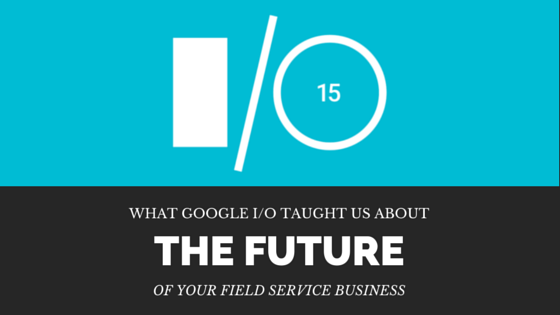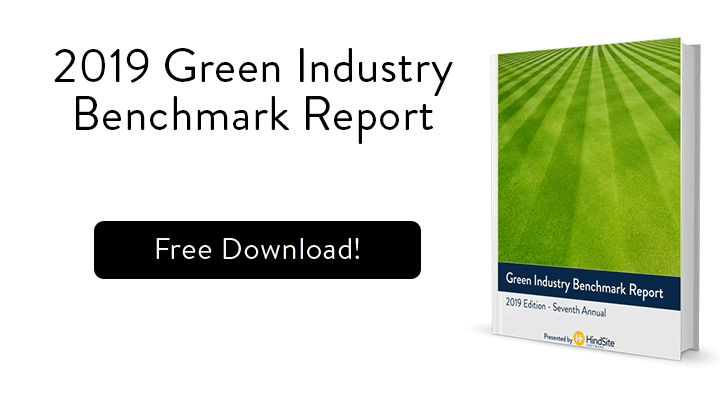
Each year Google hosts a conference for developers called Google I/O. Its audience is developers, but it's become Google's de facto launching pad for new projects. It's worth paying attention to Google I/O because Google thinks bigger than most companies on the planet and they have the engineering might to make big things happen. When Google speaks, smart businesses listen.
That's why we paid close attention to Google's announcement at I/O and thought deeply about what it may mean short-term and long-term for your field service business. So what did we learn?
The next version of Android will make your life better.
Short-term, it looks like the next version of Android, currently called Android M, will significantly improve battery life, add fingerprint support to replace PINs and passwords, introduce a new mobile payment service and support the new USB-C protocol.
What does all that mean to your field service business? Realistically, it probably won't significantly impact your day-to-day operations. If you're using mobile field service software that supports Android, your techs will appreciate the longer battery life and potentially easier access through a quick finger scan, though overall the enhancements will probably have little impact on your business.
That said, you may want to pay attention to Android Pay. Similar to Apple Pay in name and appearance, in the coming years you may be able to accept payments in the office and in the field quickly and easily.
Virtual reality will be a big part of your business.
Last summer, Facebook purchased virtual reality business Oculus Rift for $2 billion. Then, Microsoft showed off HoloLens. Google, not to be outdone, spent a significant portion of their I/O keynote discussing virtual reality, specifically Google Jump, a platform for creating virtual reality videos. The centerpiece of their presentation was a rig featuring 16 GoPro video cameras.
One of the bigger applications for virtual reality today is gaming. But if filming stereoscopic videos becomes the norm, it could have interesting implications for field service businesses. It could improve your sales process by enabling a customer to film their property and simply send it to you to review and quote. If you're a landscaper, you could use it to feature some of your work. If you run a snow removal business, it could make training and planning a lot easier. Imagine being able to virtually show your employees every problem area on a property in real-life detail, without ever leaving the office. If you perform commercial property maintenance, you could send a virtual reality video after every service, highlighting the work that you performed and proving your value.
Virtual reality is still years away from playing a role in your business, but some of the heaviest hitters - Facebook, Google, Microsoft - in the tech space are investing heavily in it.
The Internet of Things will significantly change your business.
This year at I/O Google announced Brillo, a new operating system for the Internet of Things, as well as Weave, which enables Brillo-powered devices to talk to each other. What is the Internet of Things? It's basically the idea that everything - your fridge, your toilet, your oven - will be connected to the Internet and able to send and receive data.
You're already seeing this in the green industry today. For example, there are smart irrigation controllers that can be accessed and programmed remotely. But it has even bigger implications for businesses as a whole. The Internet of Things should greatly improve the ability to diagnose and repair connected devices. Much like a car, things like irrigation systems will have sensors that can detect failures, alert the homeowner and - it you're their preferred provider - alert you. It will also apply to things like your equipment. For a lawn maintenance business, your lawn mower or edger or blower will be able to communicate with your field service software, telling it how long it was running and where, so you get complete work records with minimal input. You'll be able to easily capture more data and leverage that data to improve your business.
Loony or not, Google will bring the Internet everywhere
I admit I'm a bit of a dreamer. I was enthralled when I heard about Nikola Tesla's experiment to electrify the ionosphere and leverage the power of telluric currents to generate cheap - some say free - power. That's thinking on a grand scale.
Which is why I was equally interested in a "moonshot" project called Project Loon that Google kicked off a couple years ago. According to Google, 2/3 of the population doesn't have access to the Internet. Google makes most of its money serving Internet advertising. So it's in their best interest to deliver Internet to everyone.
Their solution: Project Loon. As the name implies, it is a little loony. Basically, they'll sail a fleet of balloons high into the atmosphere equipped with LTE technology to deliver Internet access to remote areas that aren't served by cell towers.
You're probably asking yourself "How will that impact my business?" If you're in a remote area with spotty cell phone coverage, the answer is a lot. It may take 10 years, but truly global wireless Internet is coming and it will make managing your business a lot easier.
Wearables will give you data to make your team more productive.
The Philadelphia Eagles are known for the up-tempo offense coach Chip Kelly brought from Oregon. They run plays faster than any NFL team ever has. What many thought was a gimmick offense that would not work in the NFL, has worked fairly well. The idea is that running all those plays fatigues defenses that aren't used to that tempo.
But how do the Eagles themselves avoid fatigue? They've turned to sports science to monitor their players - with apparently great results. Using advanced wearables, the Eagles team of sports scientists monitor everything from their sleep patterns, to heart rates, to food. They use that data to determine when to give players days off, when to reduce practice times, and more. According to players, they're fresher at the end of the season and it's helped them win as much as their fancy offense.
Google spent a lot of time talking about Android Wear, the operating system that powers their Android watches and other wearables. In the future, expect to see more sensors in clothing, watches and other wearable devices that deliver performance data that can help you improve your teams. Just like the Eagles, you'll be able to see whose dehydration is affecting their ability to perform in the hot summer sun. You'll see what driver in your snow removal business just can't stay awake any longer. It should save accidents and enable you to get more done.
Google I/O is a nerd's paradise. But it's more than that. It's a look into what technology one of the world's most forward-thinking companies is developing. If this year's Google I/O is any indication, the next 10 years are going to bring the Internet to everything, which means you'll have more data than ever with which to make business decisions.








